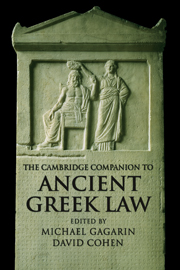2 - Writing, Law, and Written Law
from Part 1: - Law in Greece
Published online by Cambridge University Press: 28 August 2006
Summary
Athenians of the classical period so venerated their ancient law-giver, Solon, that the laws of Solon still formed the basis of Athenian law in the radical democracy. Even after they revised the law code in the late fifth century, Athenians still referred to Athenian laws as “the laws of Solon,” confusingly mingling new and old laws under this one description. Yet we are told, even these laws were flawed. Some critics are mentioned by the Aristotelian Constitution of Athens (Ath. Pol. 9.2): Solon's laws, they claimed, suffered from lack of clarity, which created disputes, and “some think this was deliberately to put the demos in charge (kyrios) of the trials.” This example brings out several of the themes of this chapter: the role of early Greek laws and law-givers like Solon, the perceived and actual importance of writing down the law, the problems that arose even when the laws were recorded in writing, and the intimate connection between written laws and the bodies which put them into action.
- Type
- Chapter
- Information
- The Cambridge Companion to Ancient Greek Law , pp. 41 - 60Publisher: Cambridge University PressPrint publication year: 2005
- 34
- Cited by



